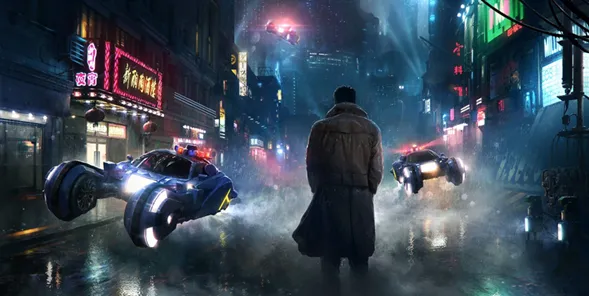
Hello friends, glad to be back again. My second book review here, this time about the science-fiction/cyberpunk cult classic Do Androids Dream of Electric Sheep? by American writer Philip K. Dick.
“In science-fiction, we dream” Ray Bradbury
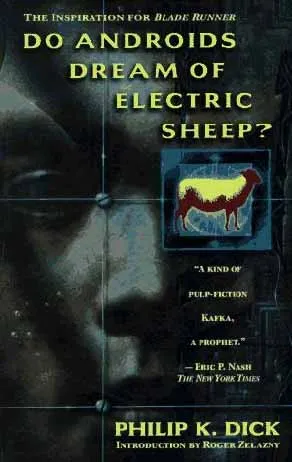
A cover of the novel
After a nuclear war has left planet Earth in ruins and nearly a desert, devoid of almost all flora and fauna, a bounty hunter is commissioned to eliminate a group of androids that has escaped the planet-colony of Mars and are now living on Earth. He agrees to do so in order to buy a live animal.
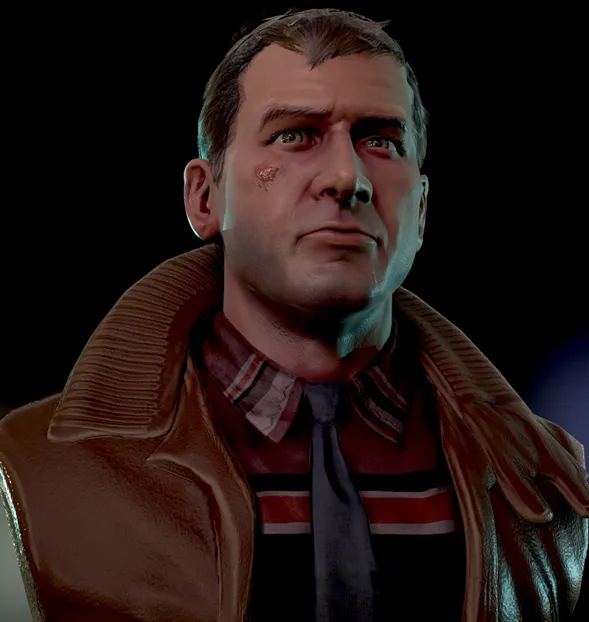
A depiction of Rick Deckard by artist Dimitri Rosner
“My schedule for today lists a six-hour self-accusatory depression.” Do Androids Dream of Electric Sheep?
One morning, year after the terminal war, in an apartment in San Francisco, Rick Deckard wakes up and has an argument with his wife, Iran, about his a machine called Penfield that us capable of alter the emotional estate of people. At breakfast they have another augment, this time about Deckard’s work as a bounty hunter who “retires” androids for a living. Before leaving for work, Deckard goes to the rooftop of the building to feed his electric sheep: his most precious possession. There he has a chat with a neighbor called Barbour who owns a real horse and is feeding it right there. In a new post-war Earth, where almost all animal species are extinct, owning a live animal has become a status symbol. And all Rick Deckard can think about is to buy a live animal for himself.

In the novel Deckard owns an electric sheep
“Owning and maintaining a fraud had a way of gradually demoralizing one.” Do Androids Dream of Electric Sheep?
Meanwhile, eight androids of the highly-advanced Nexus-6 model have killed some people in the colony planet of Mars and somehow escaped from there and are now living on Earth, right there in San Francisco. Their leader, who we will not meet until much later, is a robust, sinister, Asian-like, man called Roy Baty who used to work as a pharmaceutical in the planet-colony of Mars. The other androids are Irmgard, who is Baty’s wife, a woman called Pris Stratton, three men, Garland, Anders, Gitchel, a woman passing as an opera singer called Luba Luft (catchy name, ah) and a man called Polokov. The bounty hunter Dave Holden has “retired” two of them, Anders and Gitchel, but was injured when Polokov shot him and managed to escape.
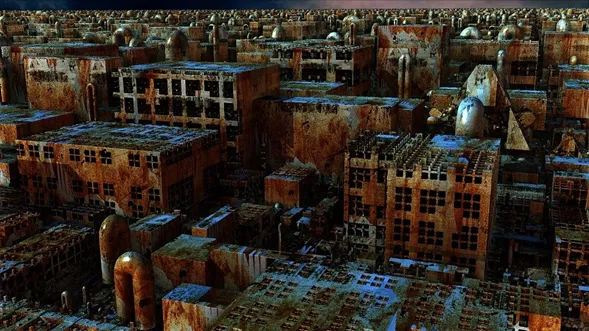
A city in ruins. Dystopia
“Emigrate or degenerate! The choice is yours!” Do Androids Dream of Electric Sheep?
Deckard puts on his genital protector, which all men have to use due to the polluted air after the war. There are particles in the air that somehow can get into men’s penises and make them infertile. There is a big sign that says: “Emigrate or degenerate! The choice is yours!” He goes to the police station where his supervisor, Harry Bryant, informs him of the androids that have escaped Mars, and orders him to “retire” them. He offers Deckard a reward of 1,000 dollars for every android he eliminates. And Deckard just thinks about the live animal he could buy with all that money… all he has to do is to kill those andrys. But first he must learn about them, those so advanced Nexus-6, so Bryant orders him to visit their manufacturer, The Rosen Association.
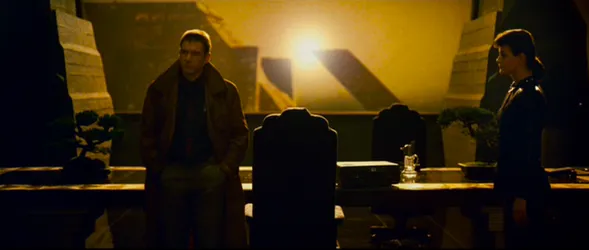
Deckard arrives at the Tyrell Corporation (The Rosen Association in the novel)
“Everything is true," he said. "Everything anybody has ever thought.” Do Androids Dream of Electric Sheep?
Deckard flies in his vehicle to Seattle, to the headquarters of the Rosen Association. There, he receives a cold welcome from an employee called Rachael Rosen. He notices there are live animals there; he is mesmerized by a cougar, he has never seen one in his entire life. Of course, a rich corporation like the Rosen can afford live animals. After a brief and bitter conversation with Rachael about a live owl, Deckard is introduced to Eldon Rosen, the CEO of The Rosen Association. Deckard applies the infamous Voigt-Kampff test to Rachael and discovers she is an android, although, like many other androids, she doesn’t know she is one. Rachael belongs to the model Nexus-6, the same as the others he has been ordered to eliminate.
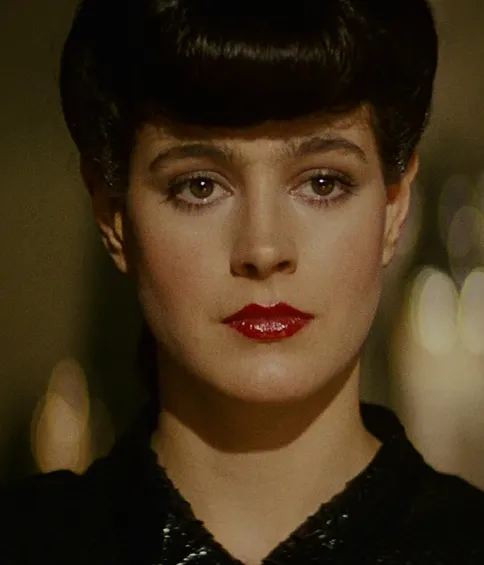
Sean Young as Rachael in Blade Runner (Rachael Rosen in the novel)
“There, at her console, he dialed 594: pleased acknowledgement of husband's superior wisdom in all matters” Do Androids Dream of Electric Sheep?
Deckard goes back to San Francisco and demands Bryant to talk to Dave Holden about the andrys. Bryant orders him to find Polokov instead. Deckard goes to Polokov’s place of work and then to his apartment, but Polokov has disappeared. He prefers to go after the opera singer Luba Luft; Bryant informs him that some Soviet agents have come to work with them and are very interested in the Nexus-6 androids. Turns out one of those agents is the android Polokov in disguise. Deckard manages to kill Polokov inside his vehicle not with his laser tube but with his old .38 gun.
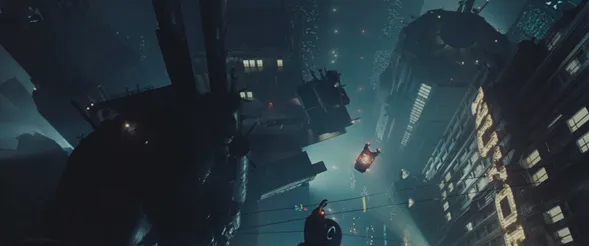
A still of Blade Runner
“Future and past blurred; what he had already experienced and what he would eventually experience blended so that nothing remained but the moment.” Do Androids Dream of Electric Sheep?
Deckard goes to the Opera Theater where the actors and singers are rehearsing Mozart’s The Magic Flute. Deckard sits and watches Luba Luft rehearsing the Papageno part and reflects again about his line of work: The Rosen Association creates those andrys and he is the one sent to destroy them. Deckard goes to Luba Luft’s chamber to meet her. Luba is an android that doesn’t know is an android. Deckard applies the Voigt-Kampff test to Luba. The female android doesn’t trust Deckard and even interrupts the test to call the San Francisco Police Department.
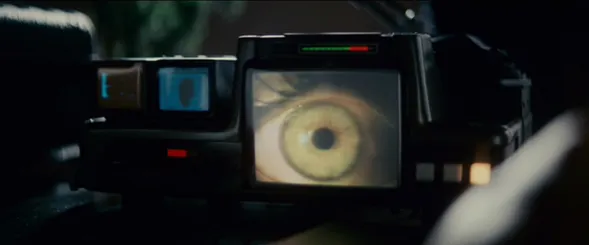
The Voigt-Kampff test as depicted in the movie Blade Runner
“Maybe there was once a human who looked like you, and somewhere along the line you killed him and took his place. And your superiors don’t know.” Do Androids Dream of Electric Sheep?
Deckard is suddenly taken to a building, supposedly The Court of Justice, but this is a set-up prepared for him by the rogue android Garland. Deckard is saved by a police officer called Phil Resch, who will kill Garland. Deckard teams up with Resch and the pair goes to The Opera House to look for Luba Luft. An employee informs them that Miss Luft has already left and went to the Museum for an Edvard Munch exhibition.

Luba Luft plays Pamina in "The Magic Flute"
“Too bad. And Mozart, not long after writing The Magic Flute, had died--in his thirties--of kidney disease. And had been buried in an unmarked pauper's grave”. Do Androids Dream of Electric Sheep?
The pair wander the halls of the Museum and take a look at the paintings. Out of the blue, Phil Resch asks Deckard if he has ever met an andry who owns an animal. Deckard answers that has only seen two cases of these in his whole life. Animals need love and affection, except for reptiles and insects, and an android is incapable of maintaining an animal alive. Then, Deckard sees Luba Luft and both men approach her. Deckard wants to take the female android to his vehicle, so not to kill her in front of other people in the museum. Luba talks to Deckard about how mysterious are human beings and how she doesn’t like androids. She just likes to imitate humans in order to understand their emotions. Phil Resch cannot tolerate these android’s opinions and kills Luba Luft inside of an elevator. After the killing, Deckard argues with Phil Resch about the rewards and tells him he is thinking about emigrating from Earth. Rick Deckard collects the rewards for “retiring” the three androids despite only killing Polokov. Garland and Luba Luft were eliminated by the hothead Resch.
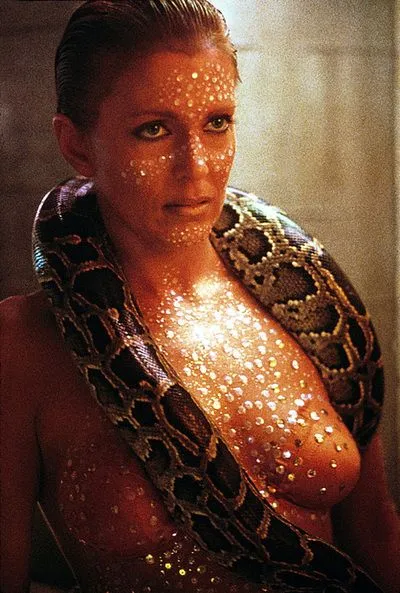
Luba Luft is substituted by Zhora in the movie Blade Runner
"An android doesn’t care what happens to another android. That’s one of the indications we look for." Do Androids Dream of Electric Sheep
Meanwhile, the female android Pris Stratton is living in the same run down building were the chickenhead J.R. Isidore lives. She has befriended the low-intelligent, stuttering, “special”, who, like all chickenheads, likes to watch a lot of TV, specially Friendly Buster, an annoying character who is almost always on TV for the whole 24 hours. Chickeheads are forbidden to emigrate from Earth, reproduce, or marry. Life goes on and about, then a knock at the door.
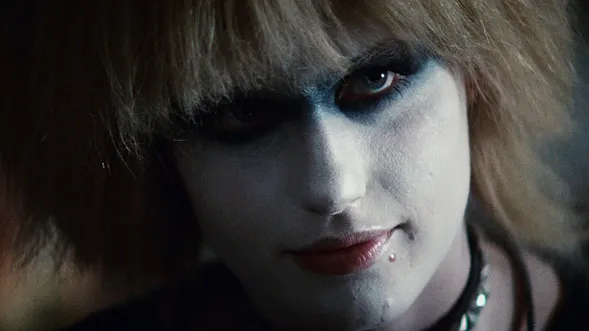
Daryl Hannah as Pris Stratton in Blade Runner
“I don't judge, not even myself.” Philip K. Dick, Do Androids Dream of Electric Sheep?
And we finally meet Roy Baty, the leader of the fugitive androids, a sinister and robust Asian-like tall man; his wife, an attractive blonde woman called Irmgard, is with him. The chicken head Isidore offers his help and is delighted to have the three of them living in the same abandoned building with him. The androids make themselves at home.
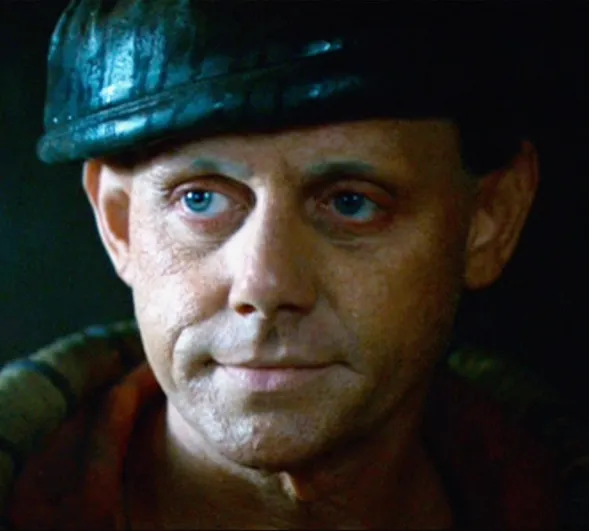
The “special” J.R. Isidore is substituted by J.R. Sebastian in the movie Blade Runner
“… classed as biologically unacceptable, a menace to the pristine heredity of the race. Once pegged as special, a citizen, even if accepting sterilization, dropped out of history. He ceased, in effect, to be part of mankind.” Do Androids Dream of Electric Sheep
With the 3,000 dollars he receives as reward for “retiring” the three androids, Deckard goes to a live animal store. This store is big, the size of an entire block, and is full of live animals; since lots of animals are extinct, live animal stores are a thriving business in this new polluted Earth. Deckard chats with the employee about the fines that exist for selling fake animals, pays a down payment of 3,000 dollars for a live goat and takes it with him. Iran is cooking dinner when Deckard arrives at his apartment building. He invites her to go up to the rooftop for a surprise; Iran takes off her apron and goes with him. Both of them are in extreme joy, now they have a live animal of their own! Even Barbour, their neighbor, the owner of a horse, is happy for them. When the Deckards go back to their apartment, Rick receives a call from his boss, Bryant, who tells him the other three androids are hiding in an abandoned building. But Rick prefers to connect himself to the machine and hallucinates about Wilbur Mercer. The figure tells him that wherever he goes he will have to make something bad, “it’s the basic condition of life”. He also tells Deckard to finish his work. Without having eaten anything, Deckard says goodbye to Iran and goes to catch the androids. But first he needs the help of another android. He calls Rachael Rosen.
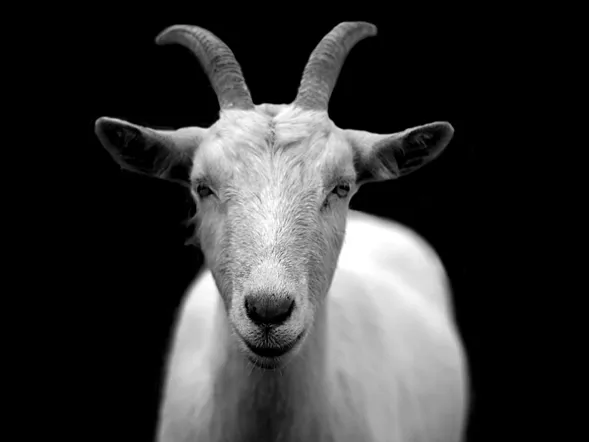
With his reward Deckard buys a live goat
"You will be required to do wrong no matter where you go. It is the basic condition of life, to be required to violate your own identity." Do Androids Dream of Electric Sheep
Rachael flies to San Francisco and meets Deckard in a hotel room. Deckard tells her about his new live goat and Rosen tells him that one of the androids he has to kill looks exactly like her; the android is the female Pris Stratton. Somehow they both end up having sex, Deckard confesses his feelings to Rachael. On the contrary, Rachael Rosen is an android, cannot have feelings and cannot reciprocate his love. Actually she confesses she has slept with other male bounty hunters as a way to dissuade them of killing other androids. They part ways and Deckard goes to the abandoned building where the other three androids, Roy Baty, Irmgard and Pris, are hiding.
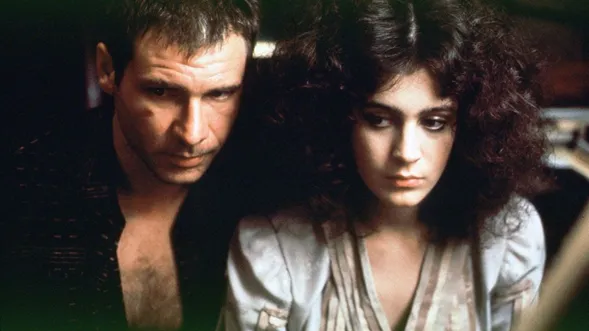
Rick Deckard and Rachael Rosen
“Love is a name for sex” Do Androids Dream of Electric Sheep
The chicken head J.R. Isidore is very happy to have the three androids with him, and has become sort of a servant to them. Roy Baty has installed an alarm in the building and orders Isidore to bring his TV set to their apartment. The chicken head does so happily; later finds a live spider which he brings also to their apartment for them to see. Roy Baty sits in front of the TV to watch the annoying Buster Friendly who says Wilbur Mercer doesn’t exist. Roy Baty agrees with everything Buster Friendly says. When Isidore shows them the spider he gets a terrible deception. Pris Stratton tortures the insect by cutting off its legs and watches as it barely walks. The android Irmgard watches all of this delightfully whereas J.R. Isidore is in shock, his mind cannot take it; he stops talking to the androids and connects himself to the machine to hallucinate about Mercer. But suddenly, the alarm goes off.
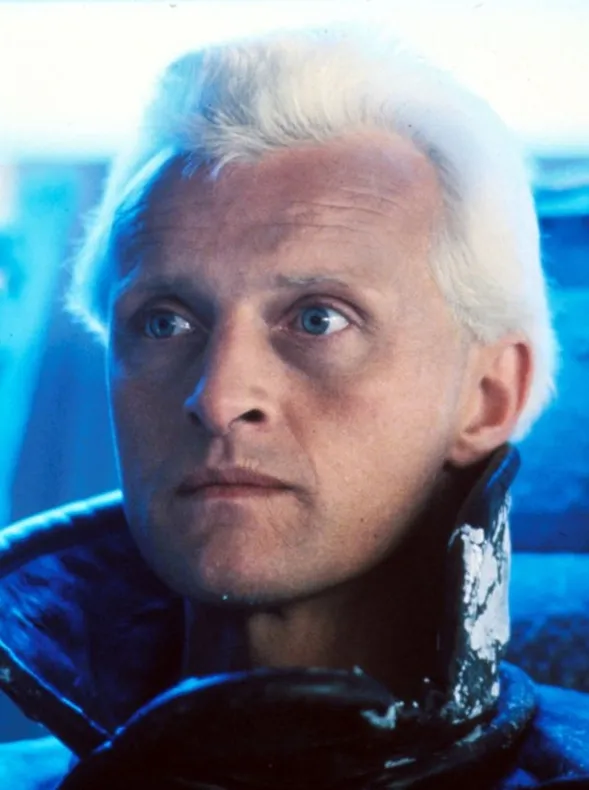
Roy Batty is portrayed in the movie by the late Rutger Hauer
“Empathy, evidently, existed only within the human community, whereas intelligence to some degree could be found throughout every phylum and order including the arachnida.” Do Androids Dream of Electric Sheep?
J.R.Isidore goes to talk to the bounty hunter who identifies himself as Rick Deckard. He tells him all of which Roy Baty has ordered him to say. But Deckard doesn’t buy it. Also Deckard realizes he’s talking to a “special”. Then the image of Rachael Rosen appears in front of him. But it’s not Rachael, it’s the android similar to her: Pris Stratton. Deckard shot his laser tube and kills Stratton, her remains all scattered on the floor. The he goes to the apartment where the other two remain. He tricks them at the door and manages to enter the apartment. Androids are not very smart. He eliminates Irmgard easily and the goes and eliminates Roy Baty. After finishing his job he leaves the building. J.R. Isidore is in tears, Deckard tells him to find another place to live. And the chicken head leaves for an unknown destiny.
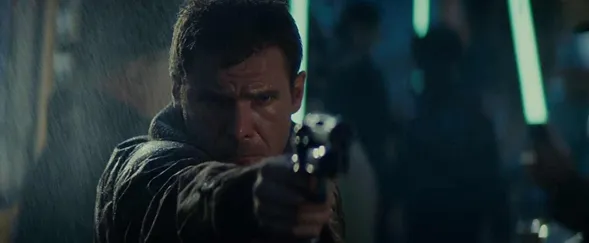
Harrison Ford as Rick Deckard
“It's the basic condition of life to be required to violate our own identity.” Do Androids Dream of Electric Sheep?
An exhausted but happy Rick Deckard returns home. His good humor is shattered when he sees anguish in Iran’s face. Iran is waiting for him at the rooftop and tells him that the goat he has just purchased is dead, a woman pushe it off the rooftop: a thin woman with a juvenile face, black hair, big black eyes, who was wearing a long silk coat. Rick cannot take it anymore. He gets into his vehicle and flies to the desert. Rachael Rosen has just killed his goat and didn’t mind to be seen, she wanted to be seen.
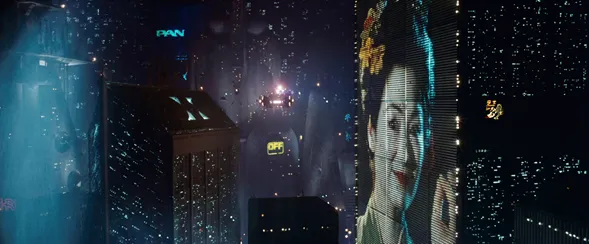
A still of Blade Runner
"The electric things have their life too. Paltry as those lives are." Do Androids Dream of Electric Sheep
Deckard gets out of his vehicle in the middle of a desert with a scorching sun bathing everything. He reflects about the cycle of life and death, feels his life is miserable, breaks down and cries. Then he has a form of vision of Wilbur Mercer. And somehow merges with Mercer and believe they are now a new being. But the hallucination is broken later. All of this sadness and misery is because of a live animal: the dead goat he just purchased. He is also very hungry. Rick concludes by thinking he should have killed Rachael Rosen when he had the chance.

Deckard goes to a desert and reflects
"In front of him he distinguished a shadowy figure, motionless. ‘Wilbur Mercer! Is that you?’ My god, he realized; it's my shadow." Do Androids Dream of Electric Sheep
He goes back to his car and sniffs a little of powdered tobacco, then calls to the police station and asks for Bryant. Bryant is not there and the woman on the screen tells him that he will receive some recognition for his work, no one has ever “retired” six androids in a single day. After that he sees a moving creature near him, right there in the desert, a toad, a living toad! He remember toads are one of Mercer favorite creatures. When he goes back home he surprises Iran with the toad he just found in the desert. But, to add one more deception in 24 hours, Iran discovers the toad is just another mechanical animal. Nevertheless the Deckards decide to keep it for them. And Rick just go to his bed, he needs to sleep. Iran goes to the kitchen. She calls and orders a batch of synthetic flies to feed the mechanical toad. Iran has a cup of coffee, black and hot.

Artwork inspired by the novel
"Do androids dream? Rick asked himself." Do Androids Dream of Electric Sheep
A trivia about Do Androids Dream of Electric Sheep
-The movie Blade Runner (1982) is not exactly based on the novel but rather “inspired” by it.
-Mercer, the messianic figure in the novel, has been compared to Jesus Christ.
-When the novel opens, the Deckards own a fake electric sheep. Some have speculated that this fake sheep represents anxiety and shame.
-Rick Deckard’s main weapon in the novel is a laser tube. In the movie Deckard’s gun is an unnamed blaster constructed out of several other guns. Check it here: http://www.imfdb.org/wiki/Blade_Runner
-The movie title was actually inspired by the name of a 1979 William S. Burroughs novella, Blade Runner. Apparently director Ridley Scott just really liked that phrase.
-The term “replicant” was invented for movie instead of the word “android” used in the novel.
-In the film adaptation, Rick Deckard is unmarried, but refers to an ex-wife in a voiceover present in the theatrical cut.
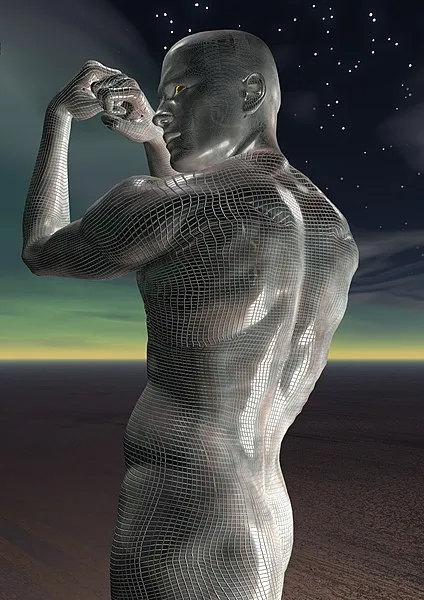
A design of an android
-In a polluted Earth, waste management is a big business.
-In the movie the character J.F. Sebastian is based on the chicken head J.R. Isidore.
-“Specials” or chicken heads are forbidden to emigrate from Earth, reproduce, or marry.
-There are fines for selling fake animals as live animals.
-Dogs cost a fortune.
-The toad and the donkey are the most precious creatures for Wilbur Mercer.
-It’s illegal to copulate with androids on Earth and also in the planet-colonies.
-In the movie, androids have super strength. But this is not mentioned in the novel.
-Although the novel specifically states that Rick Deckard is not an android, there has been an endless debate for decades about this. The movie implies that Deckard could be a “replicant” and director Riddley Scott has even stated so. But actor Harrison Ford has been adamant that Deckard is not a “replicant”.
-The spelling of the surname Baty is changed to Batty in the film.
-In the novel Roy Baty is described as a robust Asian-like man.
-In the novel, the androids are slowly trying to replace humans and derogate the Mercer religion (which they cannot experience).
-2007 Final Cut of the movie is said to be director Ridley Scott's last take; this is the one I recommend you to watch. The ending of the cut made for the TV broadcast is not good; so if, by any chance, you find Blade Runner of TV keep changing channels. Stick with the 2007 cut, trust me.
-Before passing away in 1982, Philip K. Dick saw a rough cut of the movie in the making and expressed satisfaction with the results.
Check this video for further references:
Blade Runner - What's the Difference?Let's take a look back at the original movie and the book that inspired it, Philip K. Dick's "Do Androids Dream of Electric Sheep?"
Philip K. Dick
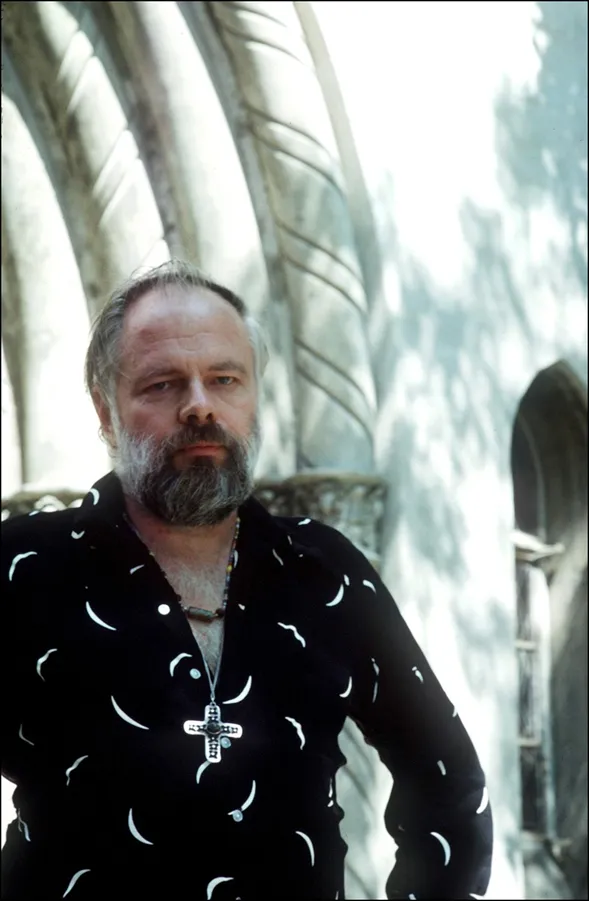
Philip K. Dick, pictured in 1982
“Today we live in a society in which spurious realities are manufactured by the media, by governments, by big corporations, by religious groups, political groups... So I ask, in my writing, What is real? Because unceasingly we are bombarded with pseudo-realities manufactured by very sophisticated people using very sophisticated electronic mechanisms. I do not distrust their motives; I distrust their power. They have a lot of it. And it is an astonishing power: that of creating whole universes, universes of the mind. I ought to know. I do the same thing.” Philip K. Dick
Born in Chicago, Illinois, in 1928, was an American science-fiction writer whose many of his works have been adapted into films. His most admired novel is The Man in the High Castle (1963), but is his 1968 novel Do Androids Dream of Electric Sheep?, the basis for the acclaimed 1982 film Blade Runner, his most well-known work.
From Wikipedia: “His fiction explored varied philosophical and social themes, and featured recurrent elements such as alternate realities, simulacra, monopolistic corporations, drug abuse, authoritarian governments, and altered states of consciousness, and often explored topics such as the nature of reality, perception, human nature, and identity.”
He received little recognition in his lifetime and was always troubled with health problems and debts. He married five times and had three children; all his marriages ended in divorce. In 1964 he attempted suicide by driving off a road.
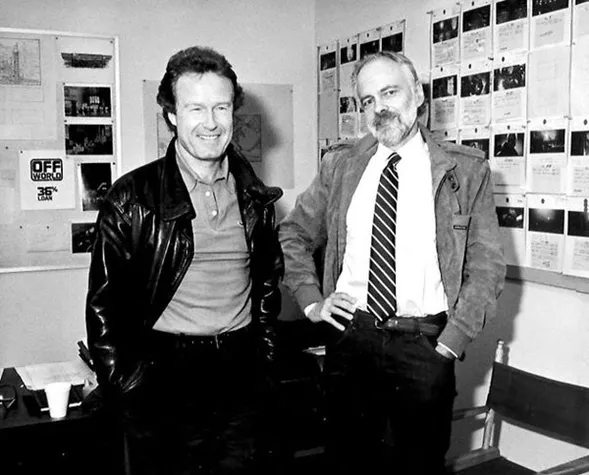
Riddley Scott and Philip K. Dick (circa 1982)
He died in Santa Ana, California, in 1982 after suffering two strokes. He died four months before the release of Blade Runner, the film based on his novel Do Androids Dream of Electric Sheep?
There have been more than 20 works from Philip K. Dick adapted to different kinds of media. Among these are: Total Recall, Minority Report, The Man in the High Castle, Blade Runner, A Scanner Darkly and Blade Runner 2049.
He has received praise from many authors like Ursula K. Le Guin, Stanisław Lem, Robert A. Heinlein and Roberto Bolaño.
His style has been compared in movies like: The Matrix, Vanilla Sky, Being John Malkovich, Adaptation, Dark City, Donnie Darko, Spider, Eternal Sunshine of the Spotless Mind and Memento.
In 2007, Dick became the first science fiction writer included in The Library of America series.
So, is Deckard an Android?
If you have read this entire post you should know by now that Rick Deckard is NOT an android. The novel even states so. Deckard took the infamous Voigt-Kampff test and the result was negative. And that part in the desert, when he breaks down is tears because of his beloved goat, tells you something: only humans are capable of such feelings, android don’t have feelings!
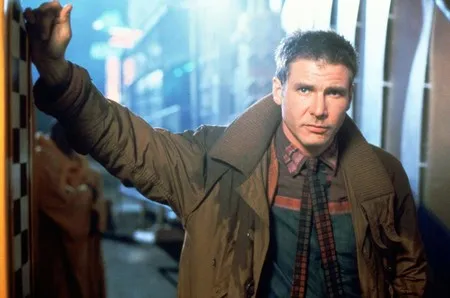
Harrison Ford as Rick Deckard.
There has been an ongoing dispute between fans of the movie for forty years about whether Deckard is a “replicant” or not. The feud even takes you to director Riddley Scott and actor Harrison Ford. While Scott says Deckard is a replicant, Ford thinks just the total opposite: he is no such thing.
In the movie Blade Runner 2049, Deckard has even conceived a daughter, how do you explain that? Only humans can do so.
Final Thoughts
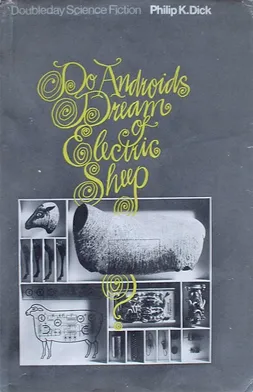
1st edition cover
A hallucinating technological dystopian nightmare. A story where androids want to be human and humans behave like androids, almost devoid of any feelings. What does it mean to be alive? Can machines live? I have read it three times already and plan to read it another three time as well. Although not a classic in the same level as Brave New World, Slaughterhouse Five or 1984, still is a worthy reading you cannot miss. A science-fiction novel that needs its place in your personal library as it has one in mine. Highly recommended.
Personally, if you ask me which one I prefer the most the novel or the movie, I will have to answer you this: As much as I love the movie, I have to prefer the novel. I wish the movie would have been more faithful to the novel, don’t you think?
Final rating: 7.5/10
Bonus
As a bonus I leave you with the closing theme of Blade Runner by Vangelis:
Blade Runner (End Titles)Blade Runner (Music From The Original Soundtrack)
This is my second book review here on ecency, check the first one here:
@thereadingman/the-god-of-small-things
This is my second science-fiction related post, check the first one here:
@thereadingman/10-of-my-favorite-science
Leave your thoughts in the comment section.
Thank you for stopping by, share this post and don’t forget to upvote.
Until next time.
Take care.
The reading man.
